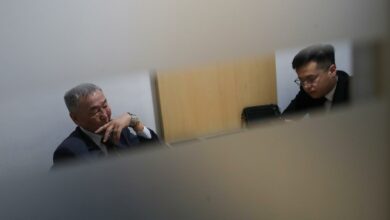5 Hongkongers acquitted of rioting but guilty of defying face mask ban

Beijing, Dec 22 (EFE).- A Hong Kong court Wednesday acquitted five alleged protesters of rioting but found them guilty of breaching the face mask ban during the 2019 protests.
The court remanded them in police custody before sentencing on Jan.11, 2022, for wearing face masks that the city government had banned.
The demonstration took place on Oct.6, 2019, a day after the authorities imposed a ban on face masks to recognize protesters.
The police arrested the five protesters, including a minor, on the same day.
The court acquitted them of the charge of causing disturbances and rioting.
The judge did not completely rule out the possibility that the defendants had only arrived at the scene when police dispersed the crowds.
The judge said they could have been there without knowing there was a protest since the police had not cordoned off the area.
Tens of thousands of Hong Kongers took to the streets on that day to protest against the ban on wearing face masks.
Protesters vandalized Chinese banks, light fires, and threw Molotov cocktails as anti-riot police fired warning shots, rubber balls, tear gas canisters, and sprayed pepper to disperse the mobs.
China responded to the 2019 protests with criminal cases and a controversial security law that entails life imprisonment for “terrorism,” “secession,” and “collusion with foreign forces.”
China also introduced election reforms in the autonomous region to bar the pro-democratic opposition leaders from contesting and ensure that only pro-Beijing politicians occupy the parliament seats.
Since Beijing began an ongoing campaign to crack down on the pro-democracy camp of the former British colony, many opposition members have chosen to stay out of politics.
The authorities have disqualified some from polls, some are in jail for alleged conspiracy to overthrow the government, and a few are in exile abroad.
Those eligible to run, including members of the Democratic Party, decided not to do so.
The Beijing-imposed electoral reform has expanded the Hong Kong legislature but made it significantly harder for opposition members to get in.
The overall seats have increased from 70 to 90, but the number of directly elected seats has decreased from 35 to 20.
There is also a new vetting committee to screen candidates for public office. It works together with the newly established national security apparatus in Hong Kong.
Critics argue that the changes will reduce the parliament to a rubber stamp.
Thus, the movement that just two years ago demanded in the Hong Kong streets an improvement of its democratic system today sees its activists in exile or prison for inciting to demonstrate.
Beijing had pledged to maintain the prevailing freedoms in the territory for 50 years until 2047 under the 1984 Sino-British Declaration.





